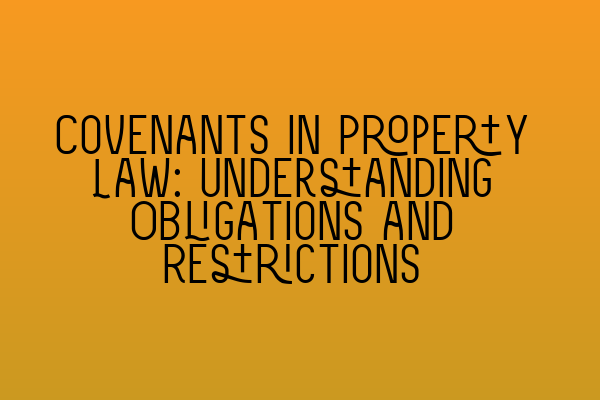Covenants in Property Law: Understanding Obligations and Restrictions
When dealing with property transactions, it is crucial to have a clear understanding of covenants. Covenants are legal obligations and restrictions that are attached to a property and can significantly impact its use and enjoyment. Whether you are a buyer, seller, or developer, having a comprehensive understanding of covenants is essential to protect your interests and avoid potential legal issues.
In this article, we will delve into the world of covenants in property law, exploring their types, implications, and how they can affect your property rights. Let’s get started!
Types of Covenants
There are two primary types of covenants: positive covenants and restrictive covenants.
Positive Covenants
Positive covenants are obligations that require the property owner to take specific actions. These actions could include maintaining the property, contributing to the maintenance of shared facilities, or paying fees to a management company.
For example, let’s say you are purchasing a property in a gated community. As part of the purchase agreement, you may be required to pay a monthly fee for the upkeep of communal gardens and security services. This would be considered a positive covenant.
Restrictive Covenants
On the other hand, restrictive covenants are obligations that restrict or prohibit certain activities on the property. These restrictions are set out in the property’s title deeds and can vary significantly depending on the nature of the property and its location.
Common examples of restrictive covenants include limitations on property usage, such as not being allowed to run a business from the property or restrictions on the types of alterations that can be made to the property’s exterior.
Implications of Covenants
Understanding the implications of covenants is crucial, as they can have a significant impact on property rights and transactions. Here are some key considerations when it comes to covenants:
Enforceability
Not all covenants are enforceable, and their enforceability depends on various factors, including their wording, intention, and compliance with legal principles. It is essential to seek legal advice to determine whether a covenant is enforceable or if it can be challenged.
Running with the Land
Covenants, especially restrictive covenants, often “run with the land.” This means that they bind future owners of the property, even if they were not a party to the original agreement. It is crucial to investigate any existing covenants on a property before purchasing to ensure compliance and avoid potential legal disputes.
Variation and Removal
In some cases, it may be possible to vary or remove a covenant. This can be a complex process and requires legal expertise. Factors such as the nature of the covenant, the parties involved, and the potential impact on neighboring properties will be taken into consideration. Consulting with a property law expert is essential in such situations.
Legal Considerations for Buyers and Sellers
For buyers, it is essential to review the property’s title deeds and conduct thorough due diligence to identify any covenants that may affect their intended use of the property. If there are restrictive covenants in place that may limit a buyer’s plans, negotiations with the seller may be necessary to seek their removal or variation.
On the other hand, sellers must disclose any known covenants to potential buyers. Failing to disclose existing covenants can lead to legal issues and potential claims for misrepresentation. It is best to be transparent and provide all relevant information upfront to avoid any complications during the transaction process.
Conclusion
Covenants play a vital role in property law, shaping the rights and responsibilities of property owners. Understanding the different types of covenants, their implications, and how they can affect property transactions is essential for both buyers and sellers.
If you require further information or assistance regarding covenants in property law, we at SQE Property Law & Land Law are here to help. Contact us for expert advice and guidance on your property-related matters.
Related Articles:
- 48. Unlocking Legal Research Skills for SQE Success
- 62. SQE2: Everything You Need to Know About the Second Stage Exam
- 53. Functioning Legal Knowledge (FLK): Core Concepts for SQE Candidates
- 65. Case Studies in SQE: Applying Knowledge to Real-Life Scenarios
- 44. Essential SQE Textbooks: Building a Solid Foundation for Exam Prep
